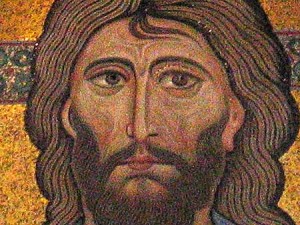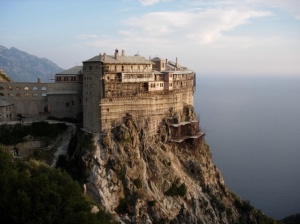 At the ordination of a priest, the consecrated Body of Christ is placed in his hands. He is told to “Guard this!” until the coming of Christ. It is a very solemn moment – the beginning of a lifetime in which a man’s relationship to bread will never be the same. It is also something of a conversion – a movement from the secular inert character of matter towards a world of sacrament, mystery and icon. This same movement should not be restricted to the ordained priesthood – for it is the most essential element of the Christian life. All of us live in a world that is sacrament – the priesthood of the Church exists for a ministry within the Church – but humanity itself was created for a priesthood of all creation. The words directed to a priest at his ordination apply to all of us: “Guard this!”
At the ordination of a priest, the consecrated Body of Christ is placed in his hands. He is told to “Guard this!” until the coming of Christ. It is a very solemn moment – the beginning of a lifetime in which a man’s relationship to bread will never be the same. It is also something of a conversion – a movement from the secular inert character of matter towards a world of sacrament, mystery and icon. This same movement should not be restricted to the ordained priesthood – for it is the most essential element of the Christian life. All of us live in a world that is sacrament – the priesthood of the Church exists for a ministry within the Church – but humanity itself was created for a priesthood of all creation. The words directed to a priest at his ordination apply to all of us: “Guard this!”
Protestant teaching early on isolated the text in 1 Peter 2 that describes believers as a “royal priesthood,” and interpreted it in a polemical manner that negated the special character of the ordained priesthood. Many Christians today have no sense of priesthood, whether it be the priesthood of Christ or of themselves. “Priest” has ceased to have much modern meaning.
Orthodoxy holds that Christ is the one, true priest. The priesthood exercised within the Church is a participation in Christ’s priesthood. But what do we mean by priesthood in the first place? How is Christ our priest?
For every high priest taken from among men is appointed for men in things pertaining to God, that he may offer both gifts and sacrifices for sins (Heb. 5:1).
The most essential act of priesthood is offering. The priest presents our offerings to God on our behalf. He gives us the blessing of God on God’s behalf. Christ’s self-offering both to the Father and to humanity is the very definition of priesthood. The focus on Christ’s sacrifice as “payment,” as well as other images, have tended to weaken the sense of offering inherent in His death. Offering, for a variety of historical reasons, has been deeply diminished from the religious consciousness of many. The inner dynamic of the Eucharist is an offering. To live the sacramental life is to live a eucharistic life, a life of offering.
For most, the word “offering” immediately invokes the image of “money.” This is not incorrect, even if it is limited. Money can certainly be an “offering,” but our thoughts on the subject probably miss the point. Money indeed has a sacramental character (as does all of creation). In a modern culture, money is something of a sacrament of all of our activity. As Christ Himself noted, it remains the primary means by which we may know the heart (Matt 6:21). Interest in spiritual things by those who do not practice “tithing” (returning to God a tenth of what we receive) can easily become an exercise in vanity. The failure to give alms generously (as in the tithe) can reduce spiritual activity to the level of a hobby. In this matter, the Orthodox differ in no wise from the non-Orthodox. Our culture is deeply enslaved by Mammon. Moderns are deeply suspicious of all things having to do with money. We see greed everywhere around us (except within ourselves). Non-believers think of Churches as rich and despise them. The myth of Church wealth is largely just that – myth. (The place of ancient land-holdings and State support of the Church, in lands such as Greece, is a separate topic).
Generosity is more fundamental than fasting (people seem to pay great attention to the latter and little to no attention to the former). I have occasionally been told that modern welfare states have made tithing a thing of the past because our taxes now support the poor, etc. Taxes, no matter how well spent, are never a matter of offering, they are not eucharistic in nature. They are the object of coercion: no one voluntarily pays more than they forced to. What Caesar does with what belongs to Caesar is of no spiritual consequence to us. It is what is offered to God that constitutes a priestly existence.
Generosity is fundamental – but it only lays a foundation. St. Maximus the Confessor taught that “man is a microcosm”: we are the entire universe gathered into personal form. If the physicists are correct, the largest number of elements within our bodies were formed in the furnace of the stars. In the words of pop-singer, Joni Mitchell, “We are stardust.”
At the same time, we are the universe gathered into conscious form. In human beings, the universe has self-understanding and can speak. Our ability to speak is perhaps the most profoundly human thing we do. The universe exists as a gift – there is no necessity in its existence – it is created out of nothing. But in the words and volition of human beings, the gifted universe can freely offer itself back to the Giver. It is this cycle of Giver-Gift-Giving that is the heart of all priestly existence (and the true heart of the Christian faith). In Chrysostom’s liturgy the priest prays:
Therefore, I entreat Thee Who alone art good and ready to listen: Look down on me, a sinner, Thine unprofitable servant; and cleanse my soul and heart from an evil conscience; and by the power of the Holy Spirit enable me, who am endowed with the grace of the priesthood, to stand before this, Thy holy table, and perform the sacred mystery of Thy holy and pure Body and precious Blood. For I draw near to Thee, and bowing my neck I implore Thee: Turn not Thy face away from me, nor cast me out from among Thy children; but make me, Thy sinful and unworthy servant, worthy to offer gifts to Thee. For Thou art the Offerer and the Offered, the Receiver and the Received, O Christ our God, and unto Thee do we send up glory, together with Thy Father, Who is from everlasting, and Thine all-holy, good, and life-creating Spirit, now and ever and unto ages of ages. Amen.
…”The Offerer and the Offered, the Receiver and the Received…” This is the very depths of the Eucharist. Read through the Eucharistic liturgy and note the use of the word “offer” and its various iterations. It is an exercise in truly hearing what is being said.
To live the sacramental life is to live the life of offering. We offer has been offered to the Receiver and the Received. To behold the Received (and the Offered) in every element and moment of creation is to see the world in its truth. This is not an exercise in the imagination or a mere interpretation of the world. The fathers teach that the pure in heart actually perceive the “Logos-ness” of creation. The relationship between Logos and His creation is true, real and substantial, not merely referential.
Modern Christians are profoundly non-sacramental. The simple statement, “We use things,” says it all. The world around us consists of things and is not perceived in its Christic relation. That this is so is only a comment on the frailty of our sinful state. That we are willing to think that this frailty is an actual description of the truth of things, however, is a comment on our perversity.
Secularism is the life of the anti-sacrament. Priesthood ceases to be a life of Offerer and Offered, Receiver and Received. In the secularized world the priest becomes something of a civil servant, a functionary. Priests are hired and fired, compared and judged. They are measured by worldly standards of effectiveness or the simple whims of parish politics. If this is the case of the ordained priesthood, then it is worse still for the priesthood of all believers. Rather than bearing the dignity of the Microcosm, the anti-sacrament modern man reduces himself to Thing and User. Users and Things cannot inherit the Kingdom of God.
Chrysostom again gives us words:
O Lord God almighty, Who alone art holy, Who accepts the sacrifice of praise from those who call upon Thee with their whole heart, accept also the prayer of us sinners, and bear it to Thy holy altar, enabling us to offer unto Thee gifts and spiritual sacrifices for our sins and for the errors of the people. Make us worthy to find grace in Thy sight, that our sacrifice may be acceptable unto Thee, and that the good spirit of Thy grace may dwell upon us and upon these Gifts here offered, and upon all Thy people. Through the compassion of Thine only-begotten Son, with Whom Thou art blessed, together with Thine all-holy, good, and life-creating Spirit, now and ever, and unto ages of ages. Amen.













